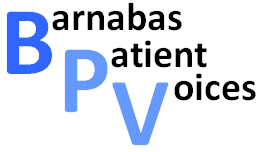PPG stands for Patient Participation Group. Since 2015 all GP practices have been required by their NHS contract to have a PPG. Barnabas Patient Voices is the Patient Participation Group for Barnabas Medical Centre.
What is a Patient Participation Group (PPG)?
A Patient Participation Group (PPG) is a group of patients, carers for patients, and GP practice staff who meet to discuss practice issues and patient experience to improve the service.
The group can meet face-to-face or virtually (online) or a mixture of the two.
What is the Purpose of a PPG?
- To give patients and practice staff the opportunity to meet and discuss topics of mutual interest.
- To provide a means for patients to become more involved and make suggestions about the healthcare services they receive.
- To explore issues from patient complaints and patient surveys, contribute to action plans and help monitor improvements.
- To contribute feedback to the practice on National Patient Survey results and Friends & Family Test feedback to propose developments or change.
- To support health awareness and patient education.
What should a PPG look like?
A PPG is open to every patient and carer on the GP practice list. All communities, groups, genders, ages, ethnicities, and disabilities representing the patient list are encouraged to join. There are no other membership requirements except that patients must be registered with the practice.
What can a PPG do?
- Discuss constructive suggestions for improving the practice, and share concerns that could affect the wider practice population.
- Organise health focused events with the practice, ie. healthy eating awareness as an information event for all practice patients to attend.
- Create a patient survey with practice staff, to get feedback about the practice from the rest of the patient population.
- Design a newsletter for the practice, to provide regular updates to patients.
- Assist the practice in making sure their website is ‘Patient Friendly’.
- Engage with the local community via fundraising events and useful health information, to ensure the PPG is representative.
- Invite health and voluntary professionals to PPG meetings, for PPG members to remain informed and updated about local opportunities for patients.
What can a PPG not do?
- PPG patient members cannot provide medical advice to other patients.
- The PPG also cannot deal with personal/medical issues, or individual patient complaints during meetings. These should be dealt with outside the meeting following the Practice’s already established procedures.
What do patients get out of having a patient group?
- The opportunity to be more involved with the practice.
- A chance to make suggestions and improve the practice.
- A means of ensuring that complaints are taken on board and necessary changes are being made.
- A way of finding out more about healthcare provisions in the local area.
- Making a contribution to the NHS and the wider community.
- Greater confidence by becoming a patient representative, having their voice heard and witnessing change happen when working as a part of a group.
- An opportunity to learn more about the NHS, GP Practices, and other ways to use their skills as a patient representative.
What does the practice get out of having a patient group?
- Understanding their patient experiences and views, thus contributing to more satisfied patients and better run services.
- A patient group suggesting simple solutions that may not have been explored before.
- PPGs can encourage health education activities amongst patients.
- A successful PPG can drive in additional income; this can contribute to developing services that will benefit patients and help to maintain the PPG itself.
